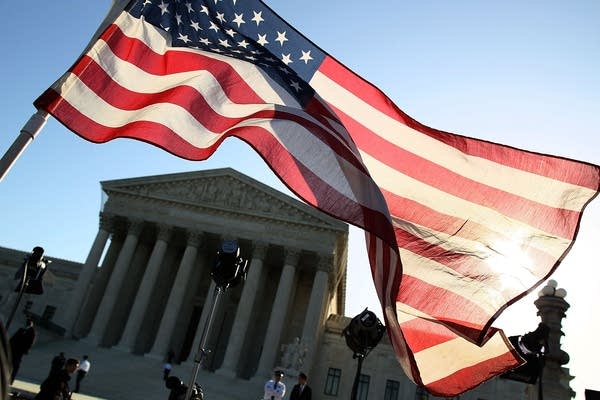Supreme Court rulings on generic drugs, Miranda rights, more
Go Deeper.
Create an account or log in to save stories.
Like this?
Thanks for liking this story! We have added it to a list of your favorite stories.

(AP) -- Here is a brief summary of decisions handed down by the U.S. Supreme Court on Monday:
PROOF OF CITIZENSHIP
The Supreme Court says states cannot require would-be voters to prove they are U.S. citizens before using a federal registration system designed to make signing up easier.
The justices voted 7-2 to throw out Arizona's voter-approved requirement that prospective voters document their U.S. citizenship in order to use a registration form produced under the federal "Motor Voter" voter registration law.
Turn Up Your Support
MPR News helps you turn down the noise and build shared understanding. Turn up your support for this public resource and keep trusted journalism accessible to all.
• Arizona citizenship proof law illegal, Supreme Court rules
PRE-MIRANDA SILENCE
The 5-4 ruling comes in the case of Genovevo Salinas, who was convicted of a 1992 murder. During police questioning, and before he was arrested or read his Miranda rights, Salinas did not answer when asked if a shotgun he had access to would match up with the murder weapon. Prosecutors in Texas used his silence on that question to convict him of murder, saying it helped demonstrate his guilt. Salinas appealed, saying his Fifth Amendment rights to stay silent should have kept lawyers from using his silence against him. Texas courts disagreed, saying pre-Miranda silence is not protected from use by prosecutors.
'PAY-TO-PLAY' GENERIC DRUGS
The Supreme Court ruled Monday that deals between pharmaceutical corporations and their generic drug competitors, which government officials say keep cheaper forms of medicine off the market, can be sometimes be illegal and therefore challenged by federal officials in court.
The justices voted 5-3 to allow the government to inspect and challenge what it calls "pay-for-delay" deals or "reverse settlements."
"This court's precedents make clear that patent-related settlement agreements can sometimes violate anti-trust law," said Justice Stephen Breyer, who wrote the court's opinion.
DRIVER RECORDS PROTECTED
The Court says lawyers may not obtain personal information from state driver license records to recruit clients for lawsuits. The justices voted 5-4 Monday in favor of South Carolina residents who objected to solicitations from lawyers to join a lawsuit against car dealers. Justice Anthony Kennedy said in his majority opinions that a lawyer's solicitation of clients is prohibited by a federal privacy law intended to shield motor vehicle records.
The court left it to lower courts to determine whether letters sent by the lawyers were predominantly efforts to recruit clients.
Among the lawyers named in the Supreme Court appeal is Richard Harpootlian, former chairman of the South Carolina Democratic party.



